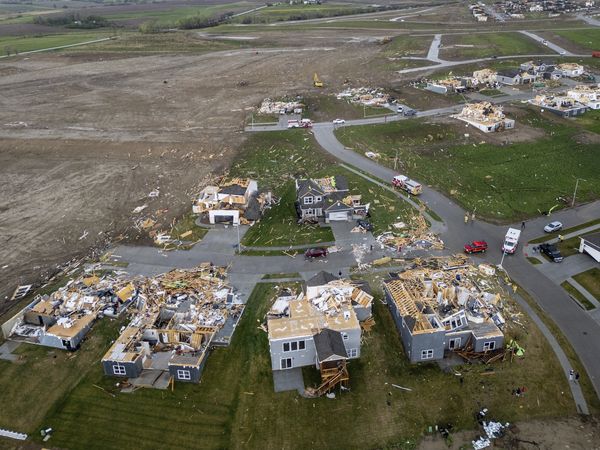
Kari Lake signaled on Tuesday that she will not contest claims that she lied about a top Arizona election official and defamed him, a significant legal concession from the Arizona Republican who has become one of the country’s most prominent election deniers.
Stephen Richer, the top election official in Maricopa county, sued Lake, her campaign and an aligned Pac last year after she lost her gubernatorial bid and repeatedly lied about him. Lake, who is now running for the US Senate, falsely accused him of injecting 300,000 illegal votes into machines and intentionally misprinting ballots so they would be rejected by ballot tabulators.
Richer said the claims turned the lives of him and his family “upside down” and made them “the targets of threats of violence, even death”. He asked a jury to award compensatory and punitive damages and wants Lake and her team to remove all false information about him from the internet.
In a court filing on Tuesday, Lake essentially conceded she won’t try to prove that her claims were true or that she had a reasonable basis to believe they were. Instead, she asked a Maricopa county judge to quickly set a hearing for a “default judgment” against her and move to hold a hearing to determine what damages, if any, she should have to pay. Lake is still requesting the empaneling of a jury to resolve any factual disputes around the damages issues.
Richer and lawyers for Protect Democracy, a non-profit organization representing him, said Lake’s filing was essentially a surrender and claimed victory. “After months of doubling down and defending their lies across Arizona, in the media, and on social media, when push came to shove, the defendants decided to completely back down and concede that their lies were just that: lies,” Richer said in a statement.
Lake denied she had conceded anything.
“I didn’t surrender, I simply cut-to-the-chase. We filed papers demanding a hearing in 30 days for Stephen to prove how my words harmed him. I am ready to go to court now, Stephen. Are you?” she wrote in a Twitter post.
In her filing, her lawyers suggested they would use the damages proceedings to dive into Richer’s medical history and political funding. Her lawyers also wrote that her request for a default judgment did not concede anything about damages because Richer had not been specific enough in his complaint about how any damages he suffered were traceable to her.
“Defendants request a jury to adjudicate any factual disputes. It is often said that defaulting admits the allegations in the operative complaint. This is a misnomer,” her lawyers wrote.
Lake’s filing is the latest development as several groups have turned to defamation lawsuits as a tool to try to hold those who spread misinformation accountable for their lies. The voting equipment vendor Dominion settled with Fox for $787.5m last year. Rudy Giuliani was ordered to pay $148.1m to two Georgia election workers. Giuliani, who received a default judgment order in his case after declining to turn over evidence, has claimed bankruptcy and has yet to pay the workers.
Earlier this year, the far-right outlet Project Veritas admitted it falsely accused a US postal worker of fraud during the 2020 election as part of a defamation suit settlement. The postal worker was also represented by Protect Democracy.
Lake’s filing came right before the case entered the discovery phase – the process during which parties exchange potentially relevant evidence, including emails and other documents in their possession. In other defamation cases, information obtained in discovery has led to humiliating public disclosures, including revelations that key Fox News talent knew claims about the election being stolen were false.
Daniel Maynard, a lawyer who is helping represent Richer, maintained in a statement that by permitting a judgment to be entered against her, Lake is conceding that she intentionally lied about Richer’s actions in the 2022 election.
“These types of unwarranted attacks on our public servants need to stop,” he said. “Those who run for public office and lose need to learn to accept defeat with grace rather than falsely attacking those who administer our elections.”
Lee Levine, a longtime first amendment lawyer, said it was not unheard of for a defendant to concede liability in a defamation case in order to focus on damages. Such a strategy may prevent the jury from hearing inflammatory information about how the defendant knew the information was false and make the case a more “antiseptic” discussion of how much money the plaintiff is owed. “From a PR perspective, it’s changing the narrative,” he said.
Still, Levine added, it was a risky strategy to solely focus on damages.
“If the plaintiff is claiming injury to reputation, they should be allowed to put on reputation witnesses to talk about how their reputation was injured,” he said. “So somebody can talk about the devastation of what was said, they believe what was said, why they thought less of the plaintiff as a result, and all the ways they were influenced by the defamation. And then, of course, family members would testify about the extreme emotional stress that the plaintiff suffered.”
RonNell Andersen Jones, a first amendment scholar at the University of Utah, said Lake may have chosen to ask for default judgment, despite appearing to have a legal advantage, to avoid an expensive defamation suit and having to turn over potentially embarrassing discovery to the plaintiffs in the case.
“As a free speech matter, the deck was stacked in Kari Lake’s favor in a case like this. She would have been litigating under the most defendant-generous standard in the world,” she said. “The plaintiff suing her would bear all of the heavy burden of proving not only that she lied but that she did so deliberately or with reckless disregard for the truth. A defendant who was confident that the things they’d said were true might not be expected to concede the case.”







